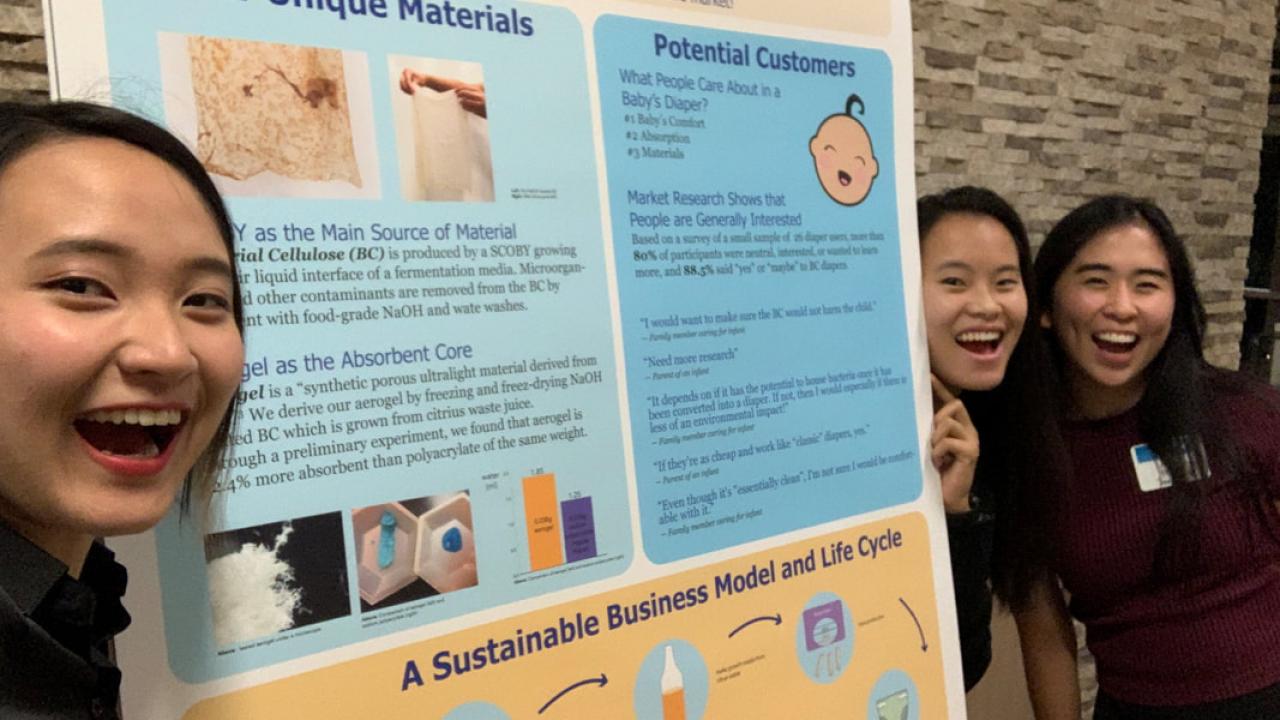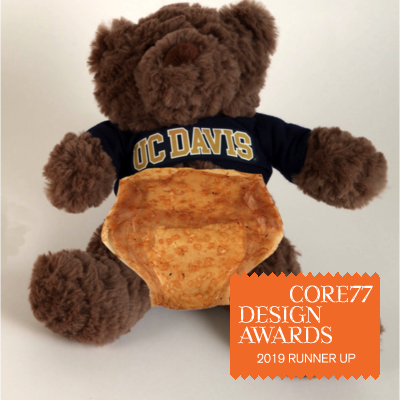
Students’ Biodegradable Diaper Project Continues to Grow

Excitement for a biodegradable diaper designed by UC Davis students just keeps growing, like the bacterial cellulose the diaper is made from.
The student group, dubbed Team Sorbit, was motivated to create the diaper by data showing about 4 million tons of disposable diapers end up in landfills, and the plastic and tree-pulp derived cellulose used in most diapers isn’t environmentally friendly. Julie Xu (design and economics), Jolee Nieberding-Swanberg (biochemistry and design), Annie Wang (materials engineering) and Sergio Gonzalez (B.S., genetics and genomics, ’19) formed the team while enrolled in the inaugural UC Davis biodesign course. The class was broken down into several teams that brainstormed and developed projects, with Team Sorbit picked to compete in the 2018 BioDesign Challenge in New York.
At the BioDesign Challenge, the team won Outstanding Science Award and was runner-up for the top prize. Early this year, the students won two awards in the “Little Bang” poster competition mounted by the UC Davis Mike and Renee Child Institute for Innovation and Entrepreneurship. This summer the team won the runner-up award and the Community Choice Prize in the Design Education Initiative category at the international Core77 Design Awards.
“Winning the awards at Biodesign Challenge meant that our idea had great, positive feedback,” said Xu. “But we did not have a solid plan to continue the project right after the Biodesign Challenge, although we didn't want to stop at that point.”
Learning about entrepreneurship
“Little Bang,” aimed at students without business experience, gave the team a boost to take the project to the next level.
“The poster competition let us reimagine this as something more than a school project,” Xu said. “It provided an excellent avenue to refine our idea and to learn about entrepreneurship. We learned that pitching a business proposal requires different framing than presenting a science or design project.”
As part of the competition they were able to work with VentureWell, an organization that assists early stage inventors, and followed up with client and supplier research.
“We interviewed many people who use diapers to see what their views are towards the sustainability of diapers, or just what needs to be improved for diapers in general,” Xu said. The team also visited a local ranch and collected ‘flooranges’ — oranges fallen from the trees that are not sellable — to grow bacterial cellulose. Typically, the bacterial cellulose used in some eco-friendly products is created from fermented tea.
Multidisciplinary undergraduate research opportunity
Team Sorbit made several discoveries while creating the biodegradable diaper. Their tests showed that the aerogel that makes up the absorbent layer of their diaper absorbs 35% more liquid than the same layer in traditional disposable diapers. Their diapers also weigh less, which cuts down on fuel consumption in transporting them. Finally, growing bacterial cellulose from citrus instead of fermented tea is cheaper, recycles agricultural waste, and makes a softer and more malleable material.
The team plans to continue research and development beyond the classroom.
“This has opened up a whole new world for me because it gave me a glimpse on the possibility of integrating biology and design, and the power of collaboration between people from different disciplines, even at an undergraduate level,” Xu said.
